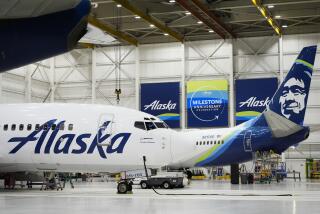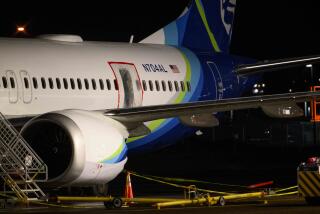Tony Salmon, Airline Pilot
- Share via
Tony Salmon,
Airline Pilot
Tony Salmon is a first officer for Alaska Airlines, so he’s seen the unprecedented turmoil in the travel industry up close. A co-pilot on the carrier’s 737 jetliners, Salmon is encountering abrupt changes both at work and home. And at age 45--his birthday is Sept. 11--he finds that whatever glamour his job once offered is starting to diminish.
*
Everything has changed to some extent. The job itself has gotten more difficult because of the increased [airport] security. Yesterday I had to take off my shoes and unbuckle my belt at Sea-Tac [Seattle-Tacoma International Airport] because I set off the initial metal alarm.
I don’t think it makes the passengers feel better seeing the guy flying their airplane undressing and taking his shoes off. Most people have a basic respect for the integrity of the guy in the cockpit, whom they trust their lives to.
Every pilot has reassessed their job. I still love my job. It takes a lot of work to get to be a pilot at a major airline. I’m an attorney, and I did that for a while, but I gave that up in order to fly.
Alaska Airlines has put some sort of security on every 737 [cockpit door] and eventually there will be a new door that is virtually indestructible. I’m in favor of that, but it does increase the isolation of the cockpit. It also means new procedures just to leave the cockpit to go to the bathroom. It makes you think twice about getting up.
This is a new frontier that none of us ever considered. The flight attendants are much more watchful of what’s going on ... there’s increased attention to the actions and behaviors of the passengers by everyone on board ... and they keep the flight crew informed if someone is acting a little strange.
I have a wife and two children, ages 20 and 24. My daughter in particular was worried about taking a trip ... she had a lot of apprehension about flying again. We had a long talk about what’s going on. I said I wouldn’t get on the airplane [at work] if I didn’t think it was safe for me and my passengers.
My fear, I think, is the same as most pilots’: That the level of screening that they’re doing is all sort of man-made screening, done by hand. They really need to take the next step ... and do a lot of this through automation. Things like universal access cards for pilots and everyone else with access to the planes, and 100% screening for all bags. Better automated screening of passengers, screening their identification.
We’re all trained to deal with hijack situations, but none of us thought someone would take an airplane and use it as a weapon. That was devastating to everyone in the business.
*
As told to James F. Peltz
More to Read
Sign up for The Wild
We’ll help you find the best places to hike, bike and run, as well as the perfect silent spots for meditation and yoga.
You may occasionally receive promotional content from the Los Angeles Times.






